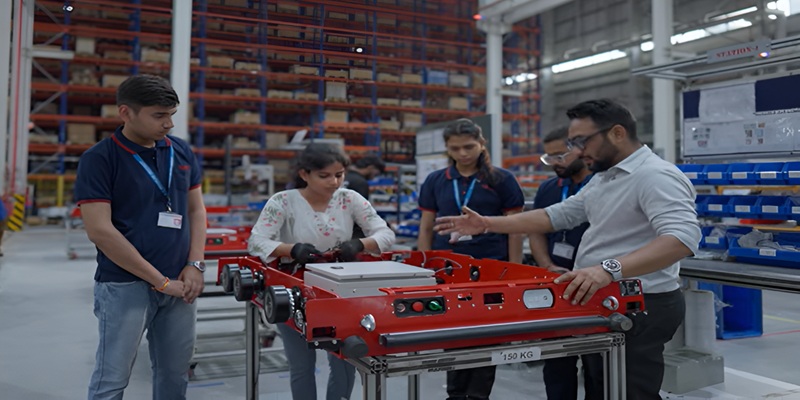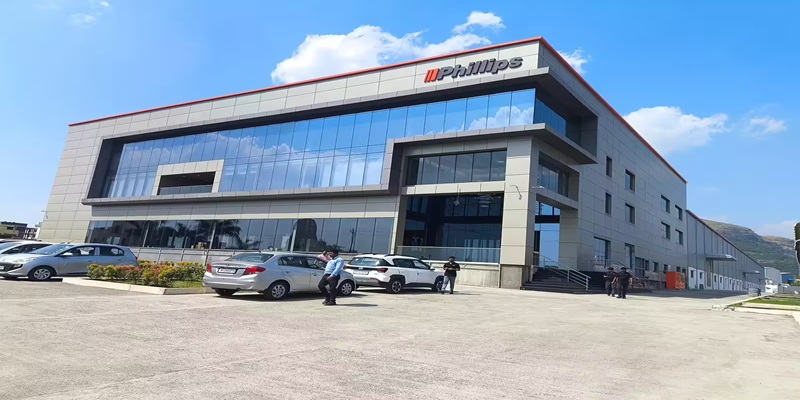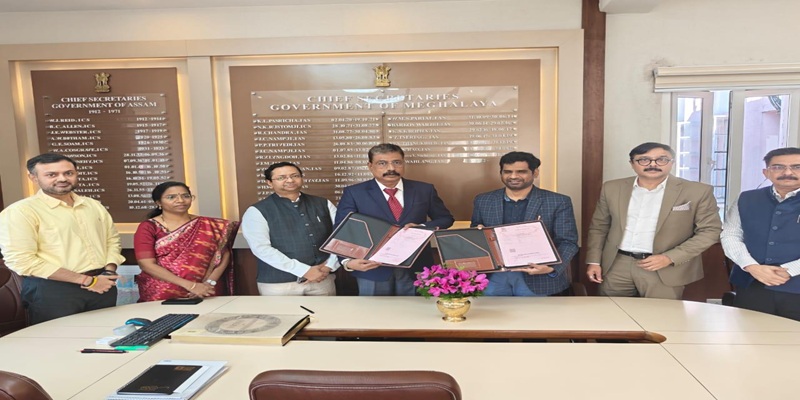Schedule a Call Back
It is important to be ‘Smart’ in today’s competitive world
 Interviews
Interviews- Nov 02,22

Though investments in modernisation are increasing across various industries (especially post Covid 19 pandemic) in India, level of advanced automation in India is still low compared to developed countries. Initiatives like Make in India and Atmanirbhar Bharat are expected to increase the pace of adoption of automation and digitalisation. In this interview with Rakesh Rao, Sunil Mehta, General Manager, Smart Manufacturing Solutions (e-F@ctory) Strategic Planning, Factory Automation & Industrial Division (FAID), Mitsubishi Electric India Pvt Ltd, explains the importance of embracing advanced technologies for increasing acceptance of made-in-India products in the international market.
What is the status of the Indian manufacturing sector in terms of modernisation and adoption of automation solutions?
If we talk about the status of Indian manufacturing sector, there could be mix of situations. In case of industries like automotive, pharmaceutical, textiles, etc automation levels are high and have increased in the last decade. Regarding digitalization and modernisation, investments are increasing across various industries post Covid 19 pandemic and that is a good situation. At the same time, there are small and medium sized industries (SMEs) where automation is not up-to the mark till date.
There is a long way to go for us to adopt the latest technologies and achieve digitalization. In developed countries, automation levels including adoption of robotics is much higher and that could be also linked to availability of space and expensive manpower. As far as adoption of robots and cobots (collaborative robots) are concerned, we are far behind the developed countries. But, initiatives like Make in India and Atmanirbhar Bharat will definitely increase the adoption of automation and digitalisation manifolds. If we embrace advanced technologies, then only products manufactured in India will get larger acceptance in international market.
What are the key challenges faced by manufacturers in India today? How can automation/digitalization help them overcome some of these challenges?
There are various challenges our manufacturers are facing these days. One of the key challenges is less availability of skilled resources for production. This challenge can be overcome by way of skill improvement programs at various levels. There are various training programs that are organised by factory automation product suppliers and also offered by various institutions in India to inculcate the desired skills in the upcoming generations. Systematic training, periodic evaluation will enhance the skill of existing employees. Employing young talent in the organisation will also result in improvement of technical skill of existing manpower in certain way.
Another bigger challenge is legacy equipment. We have large numbers of brown-field manufacturing plants where many of the equipment are old and equipped with old controllers. Many times, it becomes difficult to get necessary data from this equipment to integrate for digitalisation purpose. In this case, it can be possible to upgrade the existing control systems or install necessary sensors to pick up the data.
Third challenge is related with the RoI (return on investment). Various manufacturers look forward for RoI calculations before implementation of digitalisation and many times it becomes a bit difficult to make convincing proposals. While implementing small or big digitalisation projects in manufacturing industries, it is very much essential to involve all stakeholders for successful implementation. Periodic reviews of the progress of implementation and outcome of such projects need to be presented to increase the awareness and confidence with-in the organisation. Formation of cross functional teams and giving confidence to members involved in digitalisation projects will lead to a successful implementation. Through the years, Mitsubishi Electric India has executed many small and big digitalisation projects at various end users in different industry segments.
High upfront cost is a big put-off for companies (especially for SMEs) who intend to adopt automation. Are there low-cost entry routes into automation?
For small and medium scale companies’ low-cost automation is available. One such product is introduced by Mitsubishi Electric India Private Limited – GOC (Graphic Operator Controller). We have introduced this product few years ago in Indian market and we have seen good success with this product especially for digitalisation. Based upon the success and demand, we have further introduced upgraded version of this product in last year (GOC43).
Apart from this product, there are various other products and IoT gateways that are available in the market. Our solutions are scalable and can be implemented in phased manners. For the small and medium scale industries, it is very important to define the objective – it could be to improve quality of product, reduce energy consumption in the manufacturing plant, to implement preventative and predictive maintenance in the system, to integrate supply chain, etc. Once the objective is defined clearly, a scalable solution can be implemented.
What are key hurdles faced by companies when they adopt (or plan to adopt) automation/robotics? Any tips to make adoption hassle-free?
In my view, most of the companies have already adopted automation to certain levels. In case of automotive OEMs and auto component manufacturers, automation has been adopted in a large part. Factory automation products like PLCs, HMI, VFDs, AC servo systems, etc are being used in manufacturing.
Though robotics is not yet fully adopted by manufacturers, slowly the trend is shifting towards adoption of robotics. As robotics technology is getting matured, a greater number of options are available in the market and the system integrators are also increasing to deploy this technology. Even the old systems can be easily reconditioned with new controllers at affordable costs. While adopting automation and robotics, the user or operator need to make this adoption hassle-free. Robotics adoption is increasing in segments where repetitive movements and hazardous tasks are involved to protect a human operator from such areas and tasks. Also, robotics is adopted to obtain quality products at high speed. Our manufacturers in different industry verticals like automotive, pharmaceuticals, food & beverage, textile, packaging, printing, batteries, etc are adopting automation and robotics which holds a potential to expand in the domestic as well as international markets in the near future.
What are the emerging trends in the industry?
Mitsubishi Electric has introduced e-F@ctory, the smart manufacturing concept in around 2003 in Japan. Here in India, we are promoting our e-F@ctory concept for various industry verticals. e-F@ctory is an integral concept to build reliable and flexible manufacturing system offering high-speed information transmission over robust and high-speed industrial CC-Link IE Network. e-F@ctory is already implemented at worldwide customers in various fields such as automobiles, pharmaceutical, solar battery, secondary battery, precision equipment, semiconductors, food, metal processing etc. Mitsubishi Electric has developed e-F@ctory Alliance Partners to offer various digitalization solutions for different industry verticals with domain knowledge and integration expertise.
Mitsubishi Electric has already worked upon AI, 5G, ML, AR/VR/MR, robotics, predicative AI at various levels and now we are enhancing our offerings of factory automation products by embedding these upcoming technologies in all our products. Through the Edgecross Consortium, Mitsubishi Electric India and Japan have introduced various hardware and software for integrated solutions. We have also introduced cobot (collaborative robots) product range in recent past. In India, Mitsubishi Electric has also introduced latest products like GOC (Graphic Operator Controller), IoT Gateways etc addressing the needs of low-cost automation required for the digitalization journey.
With "Smart" becoming a buzzword for everything in the industry, how important is the adoption of intelligent (smart) software systems and solutions for increasing India's competitiveness? In today’s competitive environment, it is very much required to be “Smart” from product to software. As the factory automation products are becoming more intelligent and robust, integrating them with various softwares will be required to fetch necessary information from these automation products. As we are talking about digitalisation and smart manufacturing, integration of OT (Operational Technology) and IT (Information Technology) is required. It is essential to adopt smart software systems and solutions for increasing the productivity.
In India, as we have presence of various big IT companies and large numbers of software start-ups, different software can be implemented to improve effectiveness by the way of integration. With the help of smart software system and solutions, it is possible to integrate factory automation products to smartphones, tablets, servers, ERP systems and to cloud in a systematic way. With implementation of software like SCADA, MES, etc report generation, quality management, traceability, historical data and energy management will be possible which will enhance our small and medium-sized business enterprise to be more competitive in domestic and overseas markets.
Being an apex organisation representing the automation industry, how is Automation Industry Association spearheading the automation movement in India? Has AIA taken any specific steps for encouraging adoption of automation among SMEs?
AIA (Automation Industry Association) works mainly on three objectives - Campus Connect, Government Connect and Industry Connect. The main objective is to promote automation for the betterment of mankind and the society. AIA is working with various associations to promote automation. While working with various universities and institutions, AIA focused on enhancing skills of faculty members and engineering students of different disciplines. One of the immediate goals for AIA is to bridge the gap between academy and industries by various activities.
AIA members range across factory automation products and technology suppliers. We support industry to leverage latest technologies for being globally competitive. With emergence of Industry 4.0 and Smart Manufacturing, AIA is supporting various events and webinars to enhance necessary skills for IIoT. Further AIA will coordinate with SMEs and MSMEs for smart manufacturing initiatives.
Related Stories

Addverb: Shaping India’s Robotics Talent and Innovation
Through the provision of cobots, Trakr, AGVs, AMRs, and shuttles, Addverb aims to foster research, innovation, and skill development in robotics and automation.
Read more
Phillips Opens Expertise Centre in Pune to Boost Manufacturing Innovation
New Chakan facility to promote advanced, smart and sustainable manufacturing
Read more
ABB India Upgrades Peenya Plant, Adds 25% VSD Capacity
The new line features a combination of advanced robotics and digital production monitoring technology, handling production of large batches with speed and precision and providing real-time visibilit..
Read moreRelated Products

Digital Colony Counter
Rising Sun Enterprises supplies digital colony counter.
Robotic Welding SPM
Primo Automation Systems Pvt. Ltd. manufactures, supplies and exports robotic welding SPM.

Heat Exchanger Scale Removal Compound -hesr-300
Hi There!
Now get regular updates from IPF Magazine on WhatsApp!
Click on link below, message us with a simple hi, and SAVE our number
You will have subscribed to our Industrial News on Whatsapp! Enjoy
















